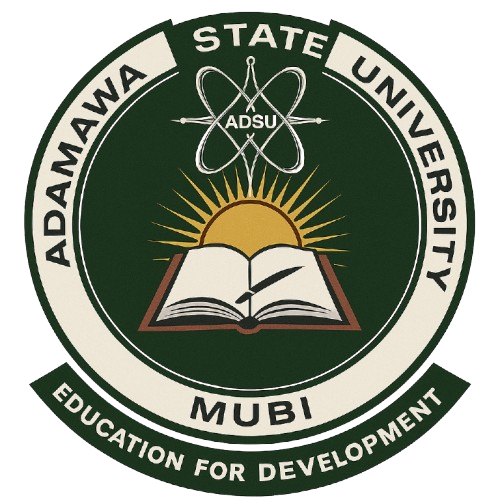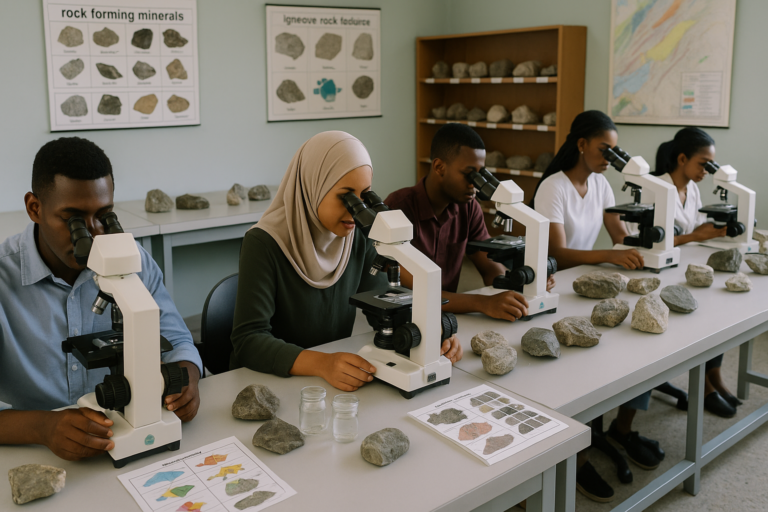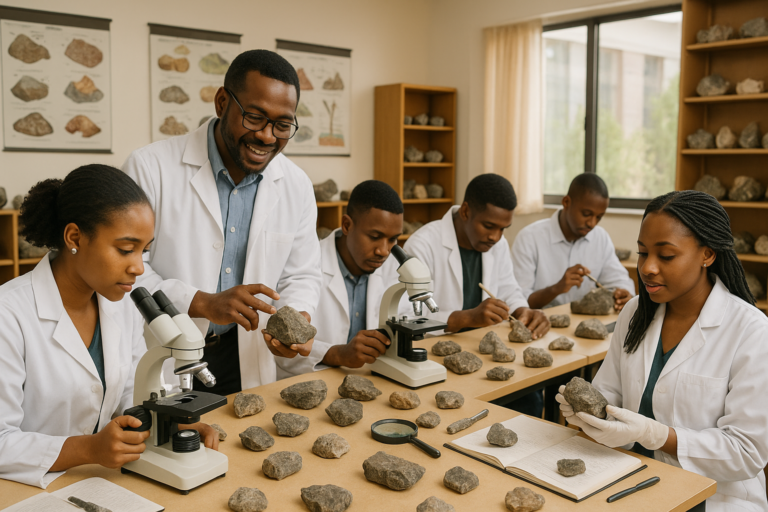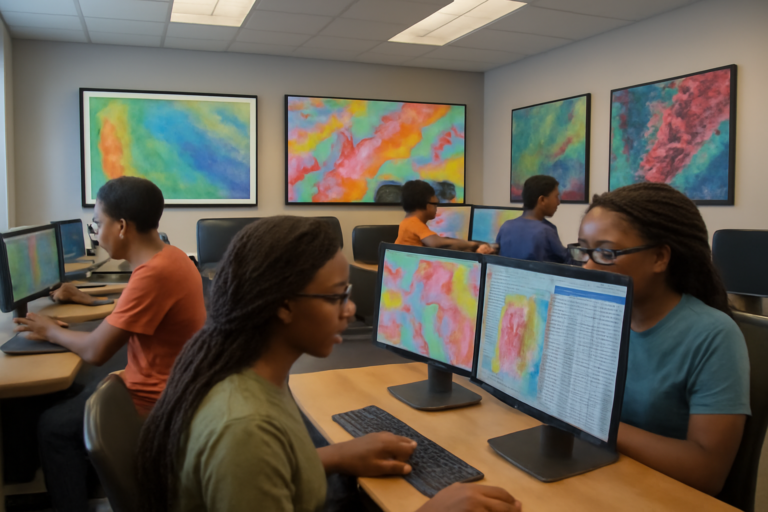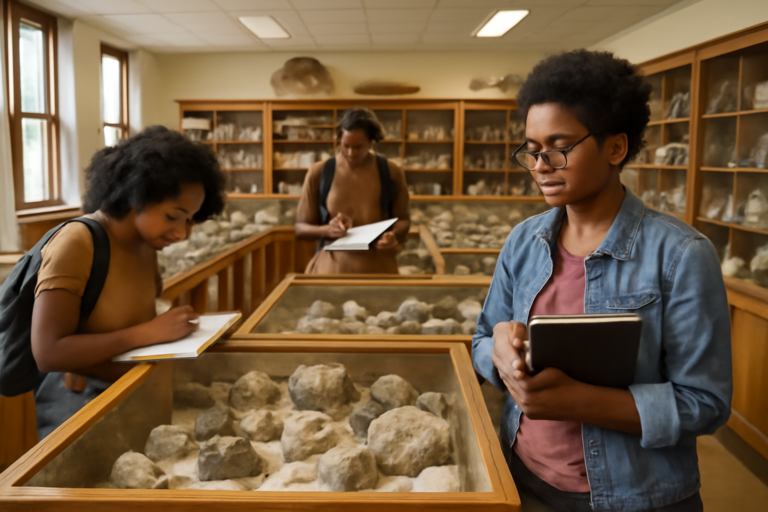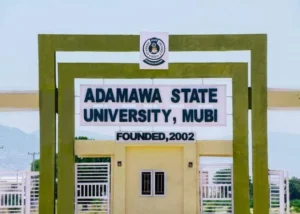Page Geology
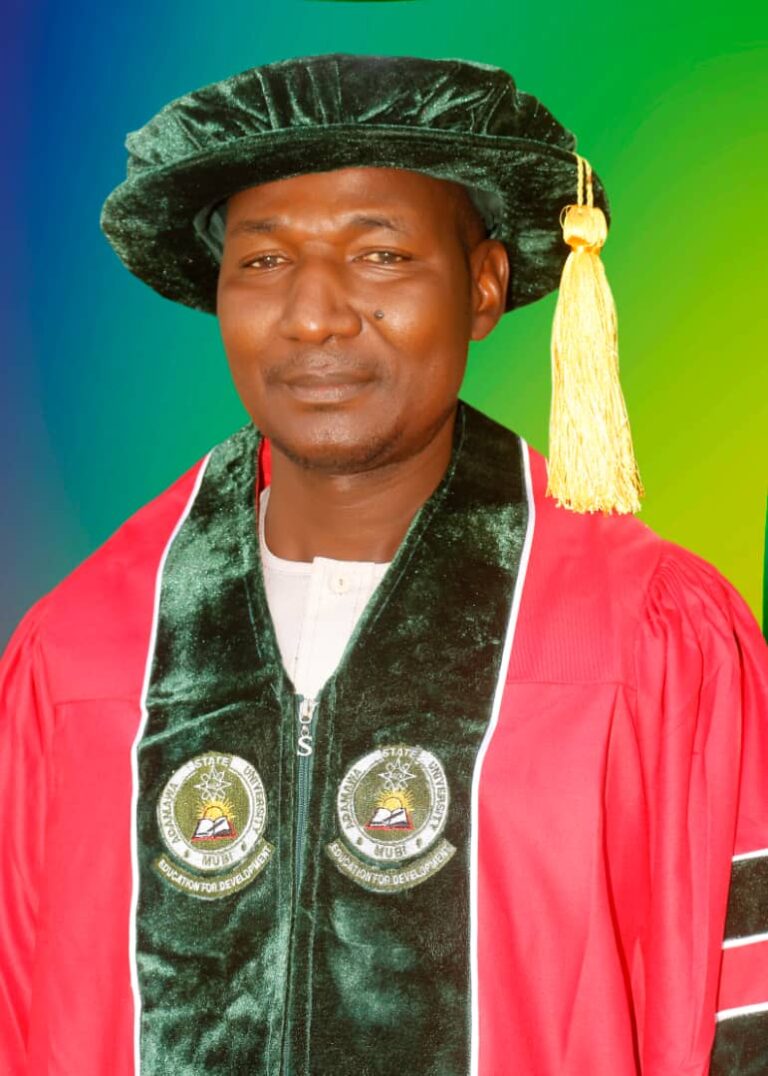
Welcome Message from the Head of Department
Welcome to Department of Geology at Adamawa State University, Mubi’ it is with great pleasure that I welcome you to our Department, in vibrant hope of academic excellence, research and innovation. The Department of Geology is commuted to providing high quality education and training to prepare our students for dynamic carriers in Geosciences and related fields. Our programme is designed to give students a solid foundation in geological principles, practical field experience and the analytical skills required to address contemporary challenges in Earth sciences.
With a dedicated team of experience and passionate Departmental members, modern teaching and laboratory facilities, and an emphasis on hands on learning, we ensure our students receive the best possible education. We also foster a culture of research and collaboration, engaging with industries and governmental agencies to promote sustainable development and resource management in Nigeria and beyond.
I encourage prospective students, researchers, and partners to explore the opportunities offer and join us in advancing knowledge for societal benefit. We are proud of our role in shaping the next generation of geoscientist and contributing to the academic growth of Adamawa state university.
Thank you for visiting our page, and we look forward to welcoming you to our department.
Dr. Kamureyina Ezekiel
Ag. Head of Department
Geology
About the Department
Uncovering Earth's Secrets, Building Tomorrow's Solutions
Programme Title: B. Sc. (Hons) Geology
Philosophy of the Department: Geology for wealth creation and national development, following the huge potentials in Adamawa state and Nigeria as a whole in terms of Minerals resources, oil and Gas. Geology as a course will adequately prepare a graduate in the field not only for employment in both government geological establishment and the private sector, but also for self-employment through skill acquisition and fit into the labour market at the end of three or four years programme.
Aims and Objectives of the Degree Programme
The main aims and objectives of the degree programme in geology are:
- Providing a steady stream of undergraduates that are academically and professionally qualified for the development and sustainable exploitation of natural resources in Nigeria.
- Providing academically and professionally qualified Geoscientists who will map and demarcate the nation’s mineral resources for development.
- To provide professionals capable of estimating reserves of our mineral resources for sustainable exploitation.
- Contributing to the development of Northern Nigeria, the Nation and, Sub-Saharan Africa through the development of and expansion programmes aimed at training and research tailored towards the needs of these areas.
- To promote collaborative activities/exchange programmes aimed at establishing and fostering relationship with sister Universities and other bodies within and outside the country.
- Providing extension and community-based services, such as project development, consultancy to government agencies, etc in the Northern zone and the nation.
Admission and Graduation Requirement
Candidates seeking admission into Geology Department must fulfill the following requirements:
- Candidates must possess credits passes in not more than two sittings at WAEC/SSCE/NECO level in at least five subjects including English Language, Mathematics, Chemistry, Physics, and Biology.
- To qualify for Direct Entry, candidates must satisfy the requirements set out in the WAEC/SSCE requirements above. In addition they must have at least a D (pass) in the Advanced level, IJMB or equivalent in at least two subjects, one of which must be Science Laboratory Technology, Geology Technology and either Mathematics, Physics, Biology, Chemistry. The passes in the two subjects must be obtained in one sitting. Candidates admitted directly will normally enroll in the second year of the program.
Learning Outcomes
(i) Regime of Subject Knowledge
Each university providing degree programme in geology is free, within the context of academic freedom and university autonomy, to decide on the content, nature and organization of its courses and modules. Therefore, geology degree programmes offered by individual universities may differ in particular characteristics and depth of treatment of individual aspects. It is however expected that all geology programmes will ensure that students become conversant with the following main aspects of geology.
- Major aspects of geological terminology, nomenclature, conventions, units and a sound understanding of the fundamental concepts in geology.
- The major groups of rocks and their characteristic features.
- Earth history and the concept of time in geology.
- Physical geology and the practical identification of common rock forming minerals and fossils.
- Crystallography, mineralogy and the principles and procedures of identifying minerals using the polarizing microscope.
- Principles and techniques of field geology and the interpretation of topographic and geologic maps.
- Systematic palaeontology covering the morphology, evolution, identification of major animal phyla including their stratigraphic and paleoecologic distributions.
- The morphology and classification of pollens and spores and their applications in stratigraphic and palace environmental studies.
- The characteristics of igneous and metamorphic rocks and the geological processes which gave rise to them.
- The characteristic features of sedimentary rocks including their structure and composition and the recognition of sedimentary environments from the rock records.
- The principles and concepts of stratigraphy and their application in sedimentary basin analysis.
- The principles and processes of formation of mineral deposits and techniques for their evaluation.
- Petroleum geology and the nature of source and reservoir rocks and hydrocarbon traps and evaluation of petroleum potential of a sedimentary basin.
- Applications of the physical and chemical properties of rocks in the design of exploration techniques in the search for groundwater, mineral deposits, hydrocarbon and engineering foundation studies.
- An appreciation of the value of fieldwork in geology, which is practicalised by field training programmes and skills acquisition through industrial attachment.
- Awareness of major issues currently at the frontiers of geological research and development.
(ii) Competencies and Skills
Geology students are expected to develop a wide range of different abilities and skills. These are divided into two broad categories as follows:
Geology – related cognitive abilities and skills Geology – related practical skills.
(iii) Behavioural Attitudes
Transferable skills that may be developed in the context of geology but are of a general nature and applicable in non-geology contexts.
Attainment Levels
Graduates of Geology are expected to have the ability to apply knowledge and skills to solving theoretical and practical problems in the exploration and exploitation of natural earth resources and also be able to carry out research in Geo-Sciences.
Programme Structure
The programme shall span for a period of four (4) years. At the end of the training period, student will graduate with B.Sc (Hons) Geology degree.
The Department is run through two semesters from 100 to 400 levels by Lectures, Laboratory practical, project and seminar. Student of the Department are expected to go on SIWES programme in their 300 level second semester.
The required minimum credit load as presented by National Universities Commission (NUC) is 18 credit units per semester to a maximum load of 24 units. Under no circumstances is a student allowed to register and take a work load that exceeds 24 credit units per semester. This includes all compulsory Departmental Courses, and any elective courses to the desire of the student and general studies (GST) Courses.
For each of the programmes, the total number of units required for graduation as prescribed by NUC’s Minimum Academic Standard is 120 credit units registered and passed within 4 academic sessions to a maximum of 6 academic sessions. Each semester has a set of Departments’ compulsory courses that must be registered first followed by set of elective courses which is left at the students’ discretion. A minimum of 18 credit units is allowed for compulsory courses and a minimum of 2 credit units to a maximum of 6 credit units for elective courses.
An academic year is divided into two semester of fifteen (15) weeks each; you are expected to register for both semesters at the beginning of every academic session. All courses, whether core or elective, departmental or non-departmental are registered for in the Department.
Students admitted at the 100 level are expected to earn a minimum of 120 Credit Unites in their four (4) years programme before they can graduate.
Those admitted at the 200 level are expected to earn not less than 90 Credit Units in their 3 years programme to qualify for graduation.
Advancement, Probation and Withdrawal
A student in Adamawa State University is entitled for advancement to the next higher level if the CGPA is > 1.00. A probation will result if the CGPA is < 1.00 at the end of the first year or subsequent semester after the first year. When the first academic session of a student ends and the CGPA of the student is < 1.00, he or she will precede to the next higher level on probation I. He/she must score a CGPA of 1.00 or more at the end of first semester of his/her second academic session in order to eliminate the probation status. If at the end of the first semester of the second academic session the CGPA is still < 1.00 he or she will be on probation II. At the end of the second semester of the second academic session if the CGPA is still < 1.00, he or she will be on probation III. A student will be advised to withdraw from his/her programme after earning probation III. Withdrawal from the University will be after earning a second probation III by a student who had earlier changed programme because of this phenomenon.
The course credit system occasionally permits interdepartmental and interfaculty transfer. For this to happen, the candidate must meet the admission requirement of the intended department or faculty. Other Departments or faculty rarely accepts students on probation. Students planning to transfer to other units of the University are advised to discuss their plans with their Academic Advisers. In addition students with more than six (6) carry-overs in a session will not be allowed to proceed to the next class.
Degree Classification
The class of the degree shall be awarded on the basis of the final grade point average as below:
a. 4.50-5.00 First Class Honours
b. 3.50-4.49 Second Class Honours Upper Division
c. 2.50-3.49 Second Class Honours Lower Division
d. 1.50-2.49 Third Class Honours
f 1.00-1.49 Pass Degree
e. < 1.00 Fail
University Examination Regulations
These regulations shall apply to all programmes of studies for first degrees. It shall not apply to higher degrees and postgraduate diplomaprogrammes of study.
these regulations, unless the context states otherwise, the under-listed definitions of terms shall apply.
Operational Definition of Terms
In Carry Over (CO) Courses
A course that is failed or missed in previous examination must be carried to next academic session.
– Continuous Assessment (CA)
It is the planned periodic assessment of students’ performance in each course per each Semester. CA shall contribute 30 per cent of the total marks for each course. It should be by means of term papers, seminars, assignments, workshops, symposia, practicals, quizzes announced and unannounced tests in lecture halls/laboratories/studios/clinics/fields, among others, as may be applicable to various disciplines.
– Course Units
Those units of lecturing, the examination results of which are aggregated to determine a student’s overall achievement for a year of study. It is a quantitative organization of the curriculum in which subject areas are broken down into course units which are examinable and for which students earn credit(s) if passed; and each examinable course units spanning only one semester.
– Credit Unit
A measure of workload, which indicate the student-teacher contact hours per week per semester. For example, two credit units is equal to two hours lecture or equivalent number of hours of practical/tutorial/field/industrial visits/teaching practice per week per semester.
– Examination
Examination includes continuous assessment during a semester and end of semester examination. It is required by the Senate in a programme of study to which these regulations apply.
– Examination Misconduct
Examination misconduct is an exercise of any one of examination fraud, examination malpractice or other actions of similar conceptual words. It is seen as negligence or incompetence of a person, which manifests before, during and after taking examinations through diverse modes and sources in university teaching, research and public/community service.
– Grade Point (GP)
The actual percentage raw score for a given course converted into a letter grade is assigned a grade point.
– Grade Point Average (GPA)
The mean weight grade point as earned in the course registered by a student during a semester, The GPA is obtained by multiplying the GP obtained in each course by the total unit (s) assigned to the course, summing up and dividing by the total of course credit unit registered in the semester.
– Cumulative Grade Point Average (CGPA)
The up to date mean of the Grade Points (GPs) earned by the student in a programme of study. It is an indication of the student’s overall achievement at any point in the Programme of study.
This is obtained by totaling GPs multiplied by the respective course credit units for all semesters to date and dividing by the number of course credit, Units registered by the student (refer to Appendix).
– Probation
A status graded to a student whose academic achievements as measured by the CGPA falls below 1.00 in a classified undergraduate degree programme at the end of any semester of study. However, for unclassified degree, the minimum is 2.40. Probation commences for such a student in the second semester of the first year of registration, (a student who remains on probation for three (3) consecutive semesters and who fails to attain the status of good academic standing at the end of that year of study shall be withdrawn from the programme.
– Programme of Study
This is the total aggregate of course units undertaken by a student, which together forms a degree course.
– Regulations
Rules and procedures governing examination management and administration including the lectures and learning activities as may be stipulated in ADSU programmes.
– Semester
The sub-division of the session/year of study into two or three sections (first semester, second semester and long vacation semester as the case may be). First and second semester each lasts 16 weeks (including registration, teaching and Examination periods) provided that not less than 15 weeks each are actually devoted to teaching during the first and second semester. There shall be long vacation 3rd semester as may be decided by the Senate.
– Session
An academic year of two semesters or as may be determined by the Senate.
– Withdrawal
This is earned by a student who is on probation for three consecutive semesters and who fails to attain the status of “good academic standing” at the end of the year of study, or is involved in examination misconduct. A student who absents himself/herself for one academic session without good reason is deemed to have been withdrawn from the University.
Departmental Resources & Facilities
Career Prospects for Graduates

Geologist

Environmental Consultant at Work

Mining Geologist

Petroleum Geologist
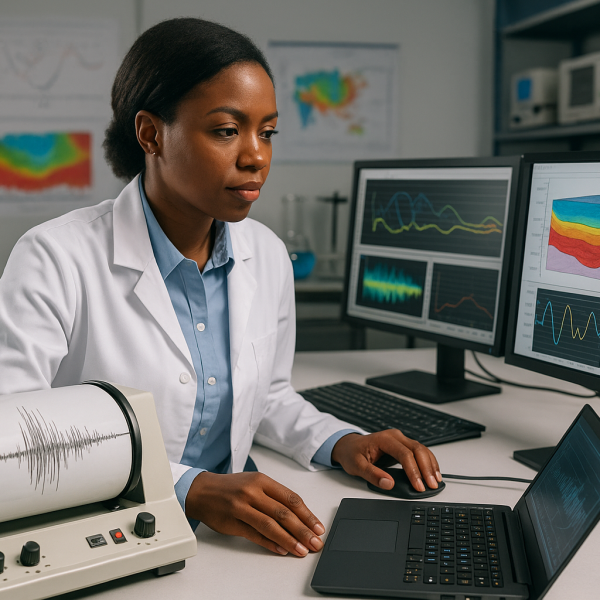
Geophysicist

Hydrogeologist
Fieldwork and Industry Exposure
Field training is central to our curriculum. Students participate in local and national geological field excursions to gain hands-on experience in real environments, collaborating with industry partners and government agencies.
